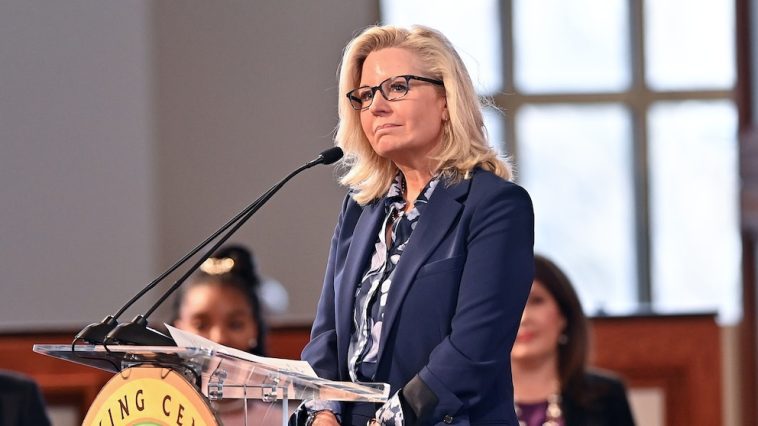Over the past weekend, Liz Cheney, the former representative for Wyoming, expressed during an interview that a failure to cast one’s vote for Kamala Harris, the Democratic presidential nominee, in the coming November election might signify a disregard for the United States Constitution. Cheney voiced these sentiments during a conversation with Jonathan Karl, an ABC News correspondent, on ‘This Week’, their popular news program.
Cheney’s revelation came while discussing her unexpected decision to publicly support Harris instead of her party’s nominee, Donald Trump. This, her endorsement of Harris, arrives as a surprise for many, as she has, in the past, once expressed extreme caution over the Democratic presidential nominee’s perceived left-leaning policies.
A pivotal figure of the Republican party in the modern era, Cheney once argued vigorously that Harris’s platforms were too liberal, and as such posed an imminent threat to many critical institutions and values in our society. As recent as 2020, she criticized Harris as an ultra-progressivist, whose policies, if implemented, could result in increased taxes and the loss of rights such as private healthcare and gun ownership.
Cheney, true to her conservative roots, also expressed concern over Harris’s potential to augment the influence and size of the federal government significantly. Furthermore, she expressed worry that her plans, if brought to fruition, could ‘re-make’ America, in a style reminiscent of the scenes occurring on the streets of cities like Seattle and Portland.
Previously, Cheney emphatically argued, ‘We cannot afford to give Harris the opportunity to actualize these plans.’ However, her new stance has deeply contradicted her previous pronouncements regarding Harris’s place in the political landscape.
Currently, Cheney’s message is that Harris should get support from conservatives, those who truly stand for the principles of the Constitution. She now asserts that it is a responsibility, a duty even, to shift our focus from the partisan wrangling of the day so as to start rebuilding a true conservative movement post this election cycle.
Her recent claim was: ‘This time, it’s not about party politics.’ Somewhat shatteringly, she alleges that a vote for Trump or an independent candidate in November would be tantamount to discarding the Constitution; a move she sees becoming worryingly accepted among many Republican ranks.
Cheney elaborated with, ‘Choosing to support Trump or to support a write-in candidate, in too many cases, has come to mean that you’ve decided to give up on the Constitution,’ a notion she, and presumably many others, find disturbing.
The former Wyoming representative went on to emphasize that Americans should not convince themselves that this decision is a mere matter of party loyalty. According to her, the stakes in this election are far beyond the confines of partisan politics.
Cheney’s sentiments present an intriguing standpoint, essentially arguing that the country’s future trajectory and constitutional fidelity far outweigh short-term partisan preferences. It’s a call to abandon singular party devotion and instead focus on the larger picture – the principles which founded the nation.
Therefore, according to her, voting for Harris, despite their political differences, is a choice that protects and prioritizes the Constitution above personal or party ideology. Her endorsement points towards a broader viewpoint, reflecting a significant shift from narrow partisan lines to the more substantial ideals underpinning the nation’s governance.
This viewpoint heralds a significant deviation from modern partisan politics, suggesting national interest and constitutional safeguarding should supersede party affiliations. It insinuates a need to return to principles, rather than clinging to the party-based allegiances that seem to overwhelmingly define today’s political landscape.
Cheney’s stance, controversial as it may be within the Republican party, offers a fresh perspective on the upcoming election’s stakes. The constitutional parameters that this election is poised to test, according to Cheney, are far reaching and of extreme importance.
Reflecting on these stark remarks, especially coming from a known conservative, it encourages an evaluation beyond party lines and an embrace of a broader understanding of the Constitution and its enduring significance. The decision lies in realigning party preferences with overarching national values, preserving the integrity of the Constitution and its principles.
Overall, Cheney’s significant transformation in views, the decision to endorse a candidate she once warned against, is evidence of a shifting political landscape. It signifies an urgency to view the current political climate beyond the partisan lens and to cherish the values of the Constitution above all else.
Liz Cheney: “This November, casting a vote for Donald Trump or writing someone in means you’ve made the decision that in too many instances so many elected Republicans have made, which is to abandon the Constitution, to tell yourself that this is simply a partisan choice. That’s… pic.twitter.com/GJPj1VlIvk
— Aaron Rupar (@atrupar) September 8, 2024


